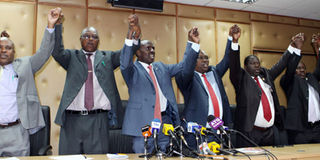Knut rules out pay talks, calls for strike

PHOTO | STEPHEN MUDIARI | FILE Knut officials led by chairman Wilson Sossion (second left), sing the solidarity song at a press conference at the union’s headquarters in Nairobi on June 17, 2013. Knut will ask its members to join the teachers’ strike on June 24.
What you need to know:
- President Kenyatta calls on teachers to go back to the negotiating table to see how the government will accommodate their pay demands
- Labour Cabinet Secretary Kazungu Kambi urges teachers to negotiate with the government instead of burdening the taxpayers
- Kuppet is demanding teachers’ allowances — commuter, leave and responsibility — be levelled to those of other public servants, while Knut is demanding implementation of an agreement signed with the government as gazetted as Legal Notice 534 of 1997
Learning in public schools across the country is set to be disrupted from Monday as the giant Kenya National Union of Teachers (Knut) calls its members out on strike.
Knut chairman Wilson Sossion’s declaration came as President Uhuru Kenyatta and Deputy President William Ruto separately said the government was willing to negotiate with the teachers over their demands for a salary increase.
Mr Sossion said the union’s National Executive Council (NEC) will meet Monday morning to ratify the boycott. Thereafter, the council, drawn from union networks across the country, will issue a statement from the Knut headquarters in Nairobi directing teachers to down their tools.
“There is no doubt that the NEC will call a strike today. We’ve met government organs relevant to this matter and feel that all avenues of negotiation have been exhausted,” Mr Sossion said on Sunday.
“At this stage, we have no choice left but to go on strike,” he said.
But President Kenyatta called on teachers to go back to the negotiating table to see how the government will accommodate their pay demands.
“Please, teachers, I plead with you. Let’s negotiate. Let’s talk. Let’s not seek to get everything within a day. Let’s take a step at a time,” the President said.
“I know your job is very important to our country. I also know what you are going through in terms of pay (versus the cost of living). Together with my predecessor, Mr Mwai Kibaki, we reached a deal on how to improve the terms of teachers,” he said.
And in Meru Town, Mr Ruto asked teachers to meet the government team for talks to ensure learning was not disrupted.
“The President has already directed that all relevant stakeholders engage in consultations to discuss the outstanding issues and ensure that they are resolved immediately. There’s no challenge too big to sit and dialogue,” he said.
Mr Sossion said the union had fulfilled the Labour Relations Act requirements for a strike.
“We had registered the dispute with (the Ministry of) Labour and issued the Teachers Service Commission (TSC) with a notice to strike but the (late) Education Minister Mutula Kilonzo intervened,” he said.
This, Mr Sossion said, was done on the condition that TSC initiates a process to have an agreement signed last September implemented in this year’s Budget.
On Sunday, Labour Cabinet Secretary Kazungu Kambi urged teachers to negotiate with the government instead of burdening the taxpayers.
“Can we sustain what they are asking for? The answer is No. No country can survive with a wage bill of 60 per cent. I ask teachers to think about the bigger picture and realise that their demands can only be met when the economy has grown,” he said.
Knut members largely drawn from the public primary schools will now join members of the Kenya Post-Primary Education Teachers (Kuppet) in the strike.
It will take up to Sh47 billion to meet the demands of the unions. Kuppet is demanding teachers’ allowances — commuter, leave and responsibility — be levelled to those of other public servants, while Knut is demanding implementation of an agreement signed with the government as gazetted as Legal Notice 534 of 1997. The pact, signed to avert a strike ahead of the 1997 General Election, was only partially honoured by the government.
The agreement would have seen the lowest-paid teacher take home Sh8,346 in house allowance up from Sh3,000 while the highest paid will earn ShSh54,544 up from Sh15,000.Medical and commuter allowances would also be increased.
Teachers have also protested that no money was set aside in the Budget for employment or promotion of teachers.
Mr Sossion has asked the government to re-allocate funds set aside for laptops for Standard One pupils to meet the demands of the teachers, terming the laptop project as a “misplaced priority.”
In secondary schools, Kuppet chairman Milemba Omboko has been leading a strike since last week whose impact is now set to be amplified by the entry of Knut.
However, TSC secretary Gabriel Lengoiboni on Sunday asked the unions to give dialogue a chance because the dispute had already been reported to the Salaries and Remunerations Commission (SRC).
“TSC is actively engaged in consultations with the SRC, and other relevant government agencies and therefore any purported strike action is premature, uncalled for and a breach of the law,” he said.
SRC chairperson Sarah Serem did not respond to inquiries by the Nation.
Mr Lengoiboni appealed to the teachers to continue discharging their duties “in line with their employment contracts and the code of regulation for teachers.”
He further asked headteachers to submit returns to the county education bosses on any cases of absenteeism, describing the calls for strike as illegal.
However, Mr Omboko asked the teachers to stay away from the classrooms and report to the union offices across the county.
Additional reports by Alphonce Shiundu and Kennedy Kimanthi




